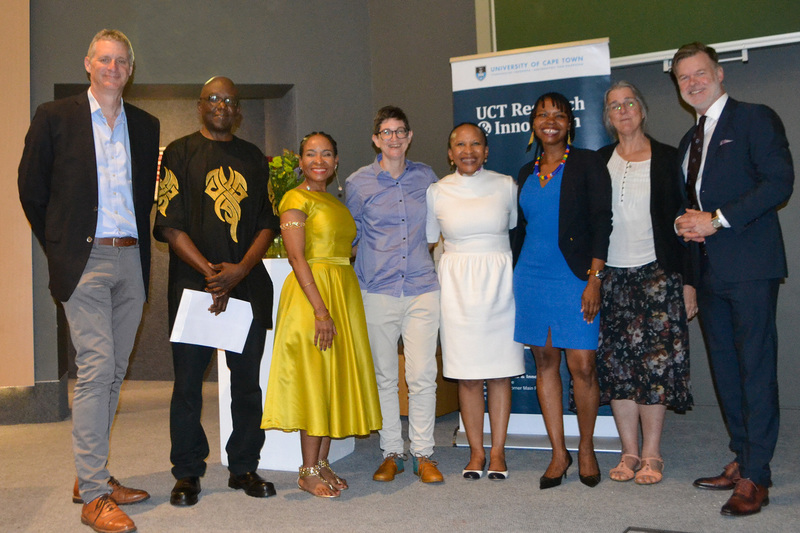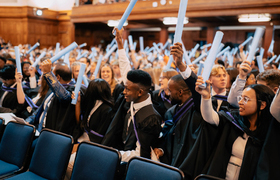Celebrating the power of research for social change
05 December 2022 | Story Di Caelers. Photo Phumla Ngcobo. Read time 7 min.
Academics have a key role to play in enhancing the impacts of public–private partnerships as demonstrated so clearly by the response to COVID-19, a panel of experts agreed during the University of Cape Town’s (UCT) prestigious Research celebration 2022.
At the event on 29 November to honour UCT’s impressive catalogue of research excellence, there was clear consensus around the deep value of research to effect change and improve health and well-being in South Africa and across the continent. This was despite the constraints imposed by pandemic-related campus shutdowns.
Equally, said Dr Linda Mtwisha, the university’s executive director of research, the event offered an opportunity to acknowledge the contributions of strategic partners, who continue to enable UCT to progress towards its goal of “unleashing human potential and knowledge towards a fair and just society”.
“To deliver on this bold and ambitious target, we really need a whole-of-society approach: industry, civil society, non-governmental organisations all working together with academics to address the challenges,” she stressed, asking the panellists to interrogate these often-contentious relationships.
Globally diverse partnerships
Taking the COVID-19 example and the establishment of the mRNA vaccine-technology transfer hub at African Biologics in Cape Town at the height of the pandemic last year, Afrigen Managing Director Professor Petro Terblanche said this work would not be possible without globally diverse partnerships.
UCT, other major South African universities and the South African Medical Research Council are collaborating to develop a technology platform to capacitate countries for pandemic preparedness, to produce mRNA vaccines, and ultimately, to build a vaccine manufacturing workforce that is mostly absent in low- and middle-income countries.
“We need a whole-of-society approach: industry, civil society, non-governmental organisations all working together with academics to address the challenges.”
This excellent example of a public–private partnership, Terblanche argued, was proof of what could be achieved when synergies unite towards a common goal “with will, and trust, from all the partners to make that happen”.
Dr Nikiwe Solomon, an environmental anthropologist and UCT lecturer, agreed that shared values were critical to strengthening public–private partnerships toward the creation “of well-being spaces”, especially given the mounting threats, such as climate change.
In her experience, she added, contentious relationships could be addressed when there was a better understanding of the common goal: “We need to examine the shared values that inform the type of research we do and the kind of collaborations that we end up making.
“Once we all understand the concerns that drive the kind of questions that researchers are asking, our mutual concern around better living spaces within cities and improved health outcomes and opportunities, then we start working better together.”
Hugo Cole, director of Policy and Strategy at the City of Cape Town municipality, pointed out that with UCT and three other major universities in the greater metropolitan area, Cape Town had a clear competitive advantage in terms of innovation in the academic space.
Boosting economic growth and job opportunities
Commercialising and applying that innovation, he continued, for the public good and to boost economic growth and job opportunities, should be a common priority: “As the City of Cape Town, we have worked hard to shift the mindset in government to one that views our data as a public resource that can really benefit researchers.
“The key is to collaborate to see those research partnerships yield academic value, but also concrete solutions to practical problems.”
Bringing the actors together for optimal outcomes remained a challenge, however, said Dr Mao Amis, founder and executive director of the African Centre for a Green Economy.
“South Africa is well-endowed in terms of research and innovation, but this does not routinely translate into real-world opportunities to solve systemic crises. On one hand, we hear impact investors saying there are insufficient investment opportunities; but on the other are the researchers struggling to get their innovations out there.
“The big question is how to get the actors within the ecosystem to talk more to each other, to find one another and so to share the burdens and the risks that we face.”
“The big question is how to get the actors within the ecosystem to talk more to each other, to find one another and so to share the burdens and the risks that we face,” he said.
Meanwhile, UCT Vice-Chancellor Professor Mamokgethi Phakeng and Deputy Vice-Chancellor for Research and Internationalisation Professor Sue Harrison stressed the need for research for impact, engaged scholarship and agile research programmes to advance the institution towards its Vision 2030.
This strategy calls for UCT to build on its globally recognised expertise in natural and social sciences, and humanities, to attract top academics from across the continent and internationally and to intensify its partnerships globally.
“We are working really hard around research support systems at UCT to ensure that we are building sustainable research programmes while also recognising the needs of our researchers during their research journeys,” Harrison explained.
They took the opportunity to congratulate a long list of high-achieving researchers, including Professor Karen Sliwa and Professor Liesl Zühlke, co-recipients of the eminent 2021 Alan Pifer Award. This award recognises socially responsive research at UCT.
Inaugural winners
Four inaugural UCT–The Conversation Africa Science Communication 2022 Awards were also presented to top writers of articles on the platform between 1 November 2021 and 31 October 2022.
The recipients were:
- Professor Richard Calland for the highest number of published articles since the inception of The Conversation Africa in 2015 (32).
- Professor John Luiz for the single most widely read article during the review period, which garnered more than 320 000 reads globally.
- Professor Marc Mendelson for the single most-read article since 2015. It garnered more than 940 000 views.
- Dr Sanya Osha for the highest number of published articles during the review period (13).
Phakeng congratulated the UCT research community for responding with innovation and agility to the challenges imposed by COVID-19 over the past three years, saying this had consistently prompted new and better ways of working.
 This work is licensed under a Creative Commons Attribution-NoDerivatives 4.0 International License.
This work is licensed under a Creative Commons Attribution-NoDerivatives 4.0 International License.
Please view the republishing articles page for more information.










